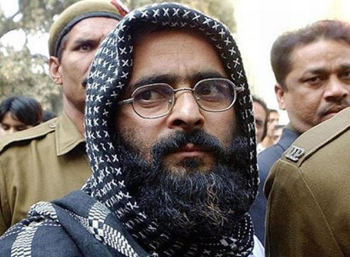
New Delhi, December 17: The Supreme Court judgment, in the case of Sangeet v. State of Haryana, delivered on November 20 could make the government give the benefit of the doubt to 14 death-row convicts including Afzal Guru, whose mercy petitions have been turned over to it by the President for fresh advice.
The one mercy petition presently pending with President Pranab Mukherjee, after the receipt of advice from Union Home Minister Sushilkumar Shinde, also carries the taint of flawed death sentence by the Supreme Court.
The Supreme Court’s five-judge Constitution Bench judgment in Bachan Singh v State of Punjab (1980) is the source of contemporary death penalty jurisprudence in India. It limited the death penalty to the rarest of rare crimes, and laid down the principle that the courts must impose the death sentence on a convict only if the alternative sentence of life imprisonment is unquestionably foreclosed. For achieving these twin objectives, the court held that judges must consider the aggravating features of the crime, as well as the mitigating factors of the criminal. However, the application of its principles by the courts to various cases has been very uneven and inconsistent.
The Sangeet judgement has reaffirmed that Bachan is the correct precedent for awarding death penalty. The relevant findings of the two-Judge Bench comprising Justice K.S. Radhakrishnan and Justice Madan B. Lokur in Sangeet, to paraphrase, are:
1. The reliance on Machhi Singh v. State of Punjab, delivered by a three-Judge Bench in 1983, as a valid legal precedent by many subsequent Benches to justify death sentences is flawed. Machhi Singh sought to compare aggravating circumstances pertaining to a crime with the mitigating circumstances pertaining to a criminal. These are completely distinct and different elements and cannot be compared with one another. A balance sheet cannot be drawn up of two distinct and different constituents of an incident. Bachan Singh resolutely refrained from balancing these elements, because it leads to arbitrary decisions by a Judge.
2. Machhi Singh sought to standardize crimes into five absolute categories, in order to identify the rarest of rare crime deserving death sentence. These five categories are manner of commission of murder, motive for commission of murder, anti-social or socially abhorrent nature of the crime, magnitude of crime and personality of victim of murder. These categories enlarge the scope for imposing death penalty that was greatly restricted by Bachan Singh.
3. Despite Bachan Singh, primacy still seems to be given to the nature of the crime. The circumstances of the criminal, referred to in Bachan Singh, appear to have taken a bit of a back seat in the sentencing process.
The Hindu has scrutinized each Supreme Court judgment in the 15 cases and found that applying Sangeet the executive could recommend commuting the death sentences in all the cases.






Comments
Add new comment